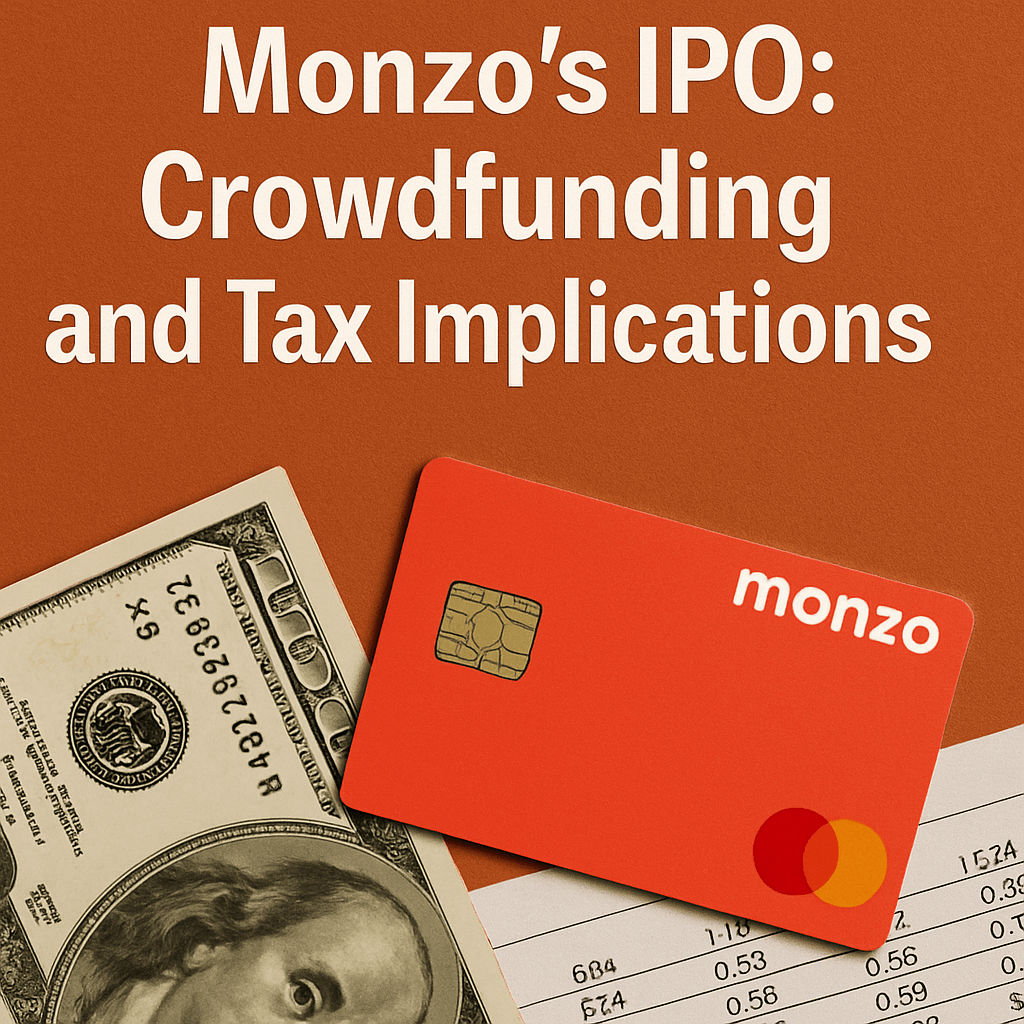Monzo’s IPO: Crowdfunding and Tax Implications

Introduction
After years of anticipation, Monzo—the UK challenger bank with over 12 million accounts—is expected to float by late 2025. This milestone will be a triumph for early crowdfunders but also a stark reminder of the capital gains tax (CGT) consequences that arise when Enterprise Investment Scheme (EIS) relief is unavailable. Below we explore the technical underpinnings of EIS eligibility, the evolution of CGT allowances, and strategies investors can employ to mitigate their tax liabilities.
1. Crowdfunding Monzo: A Decade of Growth
1.1 The Legendary Seed Rounds
In 2016–17, then-called Mondo raised £1 million on Crowdcube in just 96 seconds, crashing the platform. With a £29 million pre-money valuation and a 51p share price, round one investors saw remarkable growth:
- Round 1 share price: £0.51
- Round 2 price: £1.00
- Round 3 price: £2.35
- Round 4 price: £7.72
- Round 5 price: £14.41 (institutional mark, 2024)
An initial £1,000 stake in 2017 would be valued at over £56,000 on a £14.41 share price—a 28× return on paper, subject to the final IPO price and free float discount.
1.2 Share Classes and Lock-Up Agreements
Monzo’s capital structure includes ordinary shares and a limited tranche of “fully paid” staff shares. Early investors should note:
- Lock-Up Periods: Institutional investors often agree to 180-day lock-ups post-IPO.
- Free Float Impact: A small free float can lead to initial price volatility and wider bid–ask spreads.
- Dividend Policy: Monzo has yet to declare dividends; any future yield will affect total return.
2. EIS Eligibility: Technical Criteria and Why Monzo Missed Out
The Enterprise Investment Scheme offers income tax relief (30%) and CGT exemption on qualifying shares held for three years. Key EIS conditions include:
- Company age <15 years at the time of investment
- Gross assets <£15 million pre-investment
- Fewer than 250 employees
- Trading activity does not include banking or finance services
“Under current legislation, financial services firms—including neobanks—are explicitly excluded from EIS relief to limit systemic risk,” says tax counsel Jane Williams of LexTech Law.
Because Monzo provides regulated payment and deposit-taking services, none of its Crowdcube rounds qualified for EIS. Consequently, investors miss out on:
- 30% income tax relief on investment cost
- 100% CGT exemption on gains after a three-year holding period
3. UK Capital Gains Tax: Allowance Cuts and Rate Bands
The UK’s annual CGT exemption has shrunk dramatically:
- 2017–18: £11,300
- 2020–21: £12,300
- 2024–25: £6,000
- 2025–26: £3,000
For a hypothetical 28× gain on a £1,000 Monzo investment:
- Sale proceeds: £56,000
- Base cost: £1,000
- Gross gain: £55,000
- Tax-free allowance (2025–26): £3,000 → taxable gain £52,000
- Higher-rate CGT (24%): £12,480 tax bill
4. Comparative Neobank IPOs and Valuations
Monzo’s targeted £6.5 billion float values it against global peers:
- Chime (US): Filed for IPO at a $20–25 billion range in 2024, leveraging eight million active accounts.
- Revolut (UK/EU): Potential IPO could target a €30 billion valuation based on latest private rounds.
- N26 (EU/US): Reported €9 billion valuation in 2023, focusing on European expansion.
Monzo’s strong UK market share and ancillary services (savings pots, insurance partnerships) underpin its valuation multiples—projected at 5×–7× forward revenue.
5. Advanced Tax Mitigation Strategies
Investors facing large CGT bills should consider:
- Phased Disposal: Crystallise £3,000 gains in successive tax years to utilise annual exemptions.
- Pension Contributions: Reducing taxable income may preserve basic-rate status (18% CGT).
Example: A £10,000 personal pension top-up lowers taxable income by the same amount. - Spousal Transfers: Gifts of shares between spouses incur no immediate CGT, allowing both to use individual exemptions.
- Enterprise Management Incentive (EMI) Side Door: Some startups grant EMI options post-investment; however, Monzo did not offer an EMI scheme to crowdfunders.
6. Expert Opinions on Market Impact
“Monzo’s IPO could catalyse a new wave of fintech listings, but regulators must revisit EIS exclusions to sustain retail interest in scale-up financing,” argues fintech analyst Dr. Omar Siddiqui of NextGen Capital.
“The CGT allowance cuts disincentivise private investing. Policymakers should index the exemption to inflation and consider carve-outs for innovation finance,” adds tax partner Rachel Greene of Harrison & Co.
7. Macro Implications for UK Fintech Investment
Monzo serves as a case study in balancing retail access and tax policy. Key takeaways:
- Retail appetite for high-growth fintechs remains robust, but EIS ineligibility dampens overall yield.
- Lower CGT allowances may drive investors toward alternative vehicles—VCTs, private equity or overseas listings.
- Future policy revisions could re-open EIS relief to regulated financial services under strict limits.
Conclusion
Monzo’s impending public debut represents both a success story for UK challenger banking and a cautionary tale on tax planning. Investors must weigh the benefits of early-stage crowdfunding against evolving CGT rules and EIS eligibility criteria. As Monzo charts its course on the London market, the broader fintech ecosystem will be watching—both for valuation benchmarks and signals on how retail investors can participate profitably in the next generation of tech scale-ups.